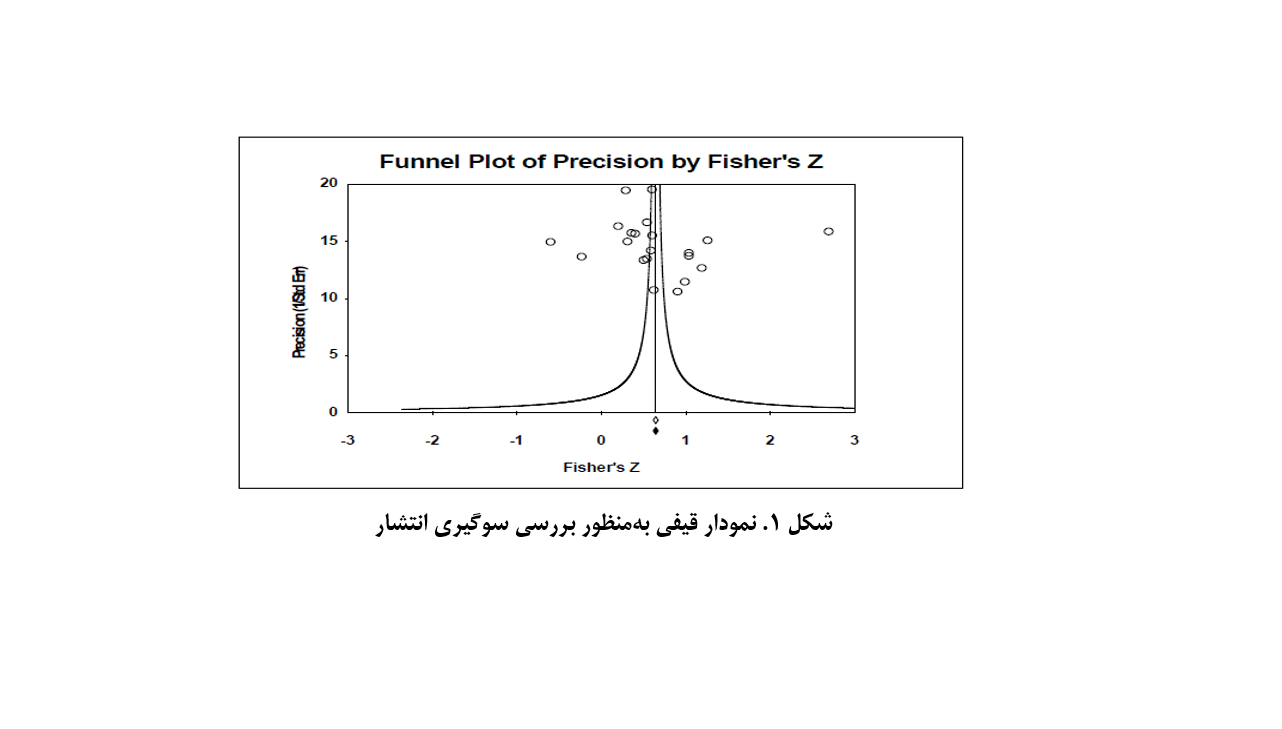Investigating the Orientation of Scientific Research in the Field of Communication Policy and Planning to Counter the COVID-19 Infodemic Using Meta-Analysis
Keywords:
Communication Policy, Communication Planning, Infodemic, COVID-19, MetaAnalysisAbstract
The present study was conducted analytically and using a meta-analysis method to investigate the orientation of scientific research in the field of communication policy and planning to counter the COVID-19 infodemic. From a methodological perspective, this research falls under fundamental studies and utilizes a library-based approach for data collection, placing it within the domain of quantitative research. The statistical population of this study comprises all research carried out in Iran from 2011 onward and international research from 2010 onward on topics similar to the present study. Publication bias, heterogeneity of effect size, and the moderating role of the statistical population were examined using CMA software. The findings revealed that the estimated effect size lies within the confidence interval, confirming the orientation of scientific research in communication policy and planning to counter the COVID-19 infodemic. Based on the results of the current study, related studies and their outcomes can broadly be categorized into two groups: antecedents and consequences of infodemic communication planning. The results further demonstrated that extensive research has been conducted on various dimensions and significant variables, as well as their relationship with communication policy and planning to combat the infodemic, indicating that the issue has been examined from multiple perspectives.
Downloads
References
Nasiri M. COVID-19 in the Mirror of Media Literacy and Cognitive Sciences. Tehran: Pashtiban Publishing; 2020.
Han H, Nguyen HN, Lee S, et al. Impact of the destination image and government policy responsiveness of China on
Korean travelers' destination trust and behaviors in the post-pandemic era. Humanities and Social Sciences Communications.
;11(1110). doi: 10.1057/s41599-024-03642-w.
Seifi E, Ahmadi A, Moazzami M. Identifying the dimensions and components of the application of new technologies
in the fourth generation university. Management and Educational Perspective. 2024;5(4):24-51. doi:
22034/jmep.2024.426783.1282.
Rafiian M, Ma'rufi S. The Role and Application of Communication Planning Approach in New Urbanism Theories.
Quarterly Journal of Architecture and Urbanism Arman Shahr. 2011;4(7):113-20.
Sturges DL. Communicating through Crisis. Management Communication Quarterly. 2023;7(3):297-316. doi:
1177/0893318994007003004.
Wang Y, McKee M, Torbica A, Stuckler D. Systematic Literature Review on the Spread of Health-Related
Misinformation on Social Media. Social Science & Medicine. 2019;240:112552. doi: 10.1016/j.socscimed.2019.112552.
Abedini Nazari N, Adab H, Chahardoli A. Designing a Model for the Integration of Physical, Informational, and
Financial Processes in the Supply Chain to Achieve Resilience in the Automotive Industry. Dynamic Management and Business
Analysis. 2024;3(1):192-204. doi: 10.61838/dmbaj.3.1.11.
Bagherian M, Babazadegan Z. Prospects of Health Public Relations in the COVID-19 Era. Tehran: Public Relations
Consultants Publishing; 2021.
Larkin J. Ignorance Isn't Strength: The Need for Secondary Education to Address Fake News 2022.
Awan AT. A Neoteric Approach Toward Social Media in Public Health Informatics: A Narrative Review of Current
Trends and Future Directions. Information. 2024;15(5):276. doi: 10.3390/info15050276.
Kumar S. Role of Social Media Health Influencers on Purchase Intention of Functional Beverages: Moderating Impact
of Health Consciousness. Information & Media. 2024;99:63-84. doi: 10.15388/im.2024.99.4.
Yu H, Hu J. ICT Self-Efficacy and ICT Interest Mediate the Gender Differences in Digital Reading: A Multilevel
Serial Mediation Analysis. International Journal of Emerging Technologies in Learning (iJET). 2022;17(05):pp. 211-25. doi:
3991/ijet.v17i05.25691.
Saveh Doroudi M. Media Literacy and Crisis Management. Tehran2018.
Depoux A, Martin S, Karafillakis E, Preet R, Wilder-Smith A, Larson H. The pandemic of social media panic travels
faster than the COVID-19 outbreak. Journal of Travel Medicine. 2020;27(3). doi: 10.1093/jtm/taaa031.
World Health Organization. Infodemic Management: A Key Component of the COVID-19 Global Response. Weekly
Epidemiological Record. 2020;95(16):145-60.
Túñez-López M, Vaz-Álvarez M, Fieiras-Ceide C. COVID-19 and Public Service Media: Impact of the Pandemic on
Public Television in Europe. El Profesional De La Información. 2020. doi: 10.3145/epi.2020.sep.18.

Downloads
Published
Submitted
Revised
Accepted
Issue
Section
License
Copyright (c) 2025 Journal of Study and Innovation in Education and Development

This work is licensed under a Creative Commons Attribution-NonCommercial 4.0 International License.










